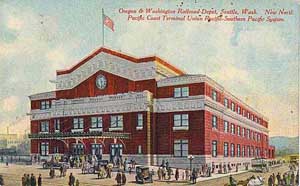In April 1918, all Seattle railway terminals, with the exception of King Street Station and the Pacific Coast Company, are consolidated. This agreement provides 22 employees for all transcontinental passenger offices in Downtown Seattle. Each railroad line receives a prorata, or proportionate share of employees. The move improves the previously chaotic management of the terminals.
The Great War
The consolidation occurred in the context of World War I. After the United States entered the Great War against Germany on April 6, 1917, the role of the city's new union stations became clear. Throughout the country, war production spurred increased passenger and freight traffic. Locally, the war effort choked freight yards, drawing attention to the absence of comprehensive organization among rail lines using the waterfront and station yards. Knots of trackage and growing freight shipments bottlenecked operations around both the King Street and the Oregon and Washington stations.
Before the war, lack of cooperation among competing railroad companies had created chaotic railroad operations near the station and docks. Companies found it necessary to send freight through extensive circuitous paths in order to reach rail yards only blocks away. Multiple freight crews working for separate rail companies sorted identical sets of cars, creating multiple, conflicting systems.
Federal Intervention
Finally, the federal government intervened. U. S. President Woodrow Wilson (1856-1924) announced the federal government's takeover of the railroads on December 28, 1917. This intervention played a part in the 1918 consolidation, waking Seattle from an escalating nightmare of inefficiency. Not that Seattle was singularly guilty of poor freight management. The government took over coordination of all American railroads during the war, and did not return control until March 1, 1920.
Consolidation affected the Oregon and Washington Station's lines, including Union Pacific and Milwaukee Road lines. The King Street Station and the Pacific Coast Company were unaffected.

